Edmund J. Spicer's
Adventures in Amstrad PD
The launch of utilities such as The Quill, The Graphic Adventure Creator, and the PAW, back in the 1980s allowed avid text adventure players to easily become game writers. A lot of the homegrown adventures from fledgeling authors were never completed. And those that were, often never made it past the bedroom door or beyond a small audience of friends. Getting your game published commercially, or even selling it yourself, took a great deal of effort.
On machines like the Amstrad CPC, another option was available; releasing games as public domain. It was a route to market that Edmund Spicer took as a teenager in the late 1980s. I contacted him in April 2021 to find out what he remembered about his youthful forays into adventure writing and his memories of the Amstrad PD software scene of the time.
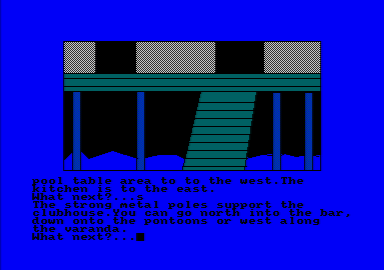 |
| The Race (above) and The Ring (below) |
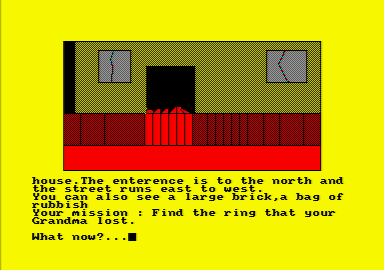 |
How did you get into computing… and what were your first experiences with adventure games?
"I turned ten years old in the mid 1980s, and my parents very kindly decided to buy me a computer as a Christmas / birthday present around that time. They wanted a machine that would be good for playing games but also for "serious" applications such as school work. So one Saturday they went into the local branch of Boots (who sold computers in those days) and ended up buying me an Amstrad CPC 6128 after discussions with a sales assistant. I wasn't with them at the time and they hadn't even asked me beforehand if I had a particular brand in mind! I wouldn't have known what to ask for anyway, and in fact they made an excellent choice. I loved my CPC 6128 and only retired it in 2003 when I bought my first ever Windows PC."
"The first adventure game I ever remember buying and playing was "Heroes of Karn". There was a stall in a local market where they sold cheap games on cassettes. I enjoyed playing it, but the game was very hard and I never got close to completing it. This might be one reason why my adventure games were all quite simple, small (in terms of locations) and quite short. I wanted players to stand a chance of actually being able to complete them!"
You were an avid reader of some of the computer magazines of the time, such as Amstrad Computer User, Amstrad Action, and CPC Attack. In those days we relied on the magazine adventure columns when we got stuck in games. You can be spotted sharing some of your hints and tips for several adventures, such as The Race, in various issues…
"My Mum bought me the May 1987 edition of Amstrad Computer User (ACU) as a one-off. After that, my Grandma bought me ACU every month from January 1988 and then Amstrad Action (AA) as well from later that year, or maybe starting in 1989. I can't remember when I stopped reading both magazines; probably in 1991 or so."
"I was able to offer hints about The Race because that was one of my games! I'm pretty sure that I never sent in hints or tips about games that I hadn't written myself."
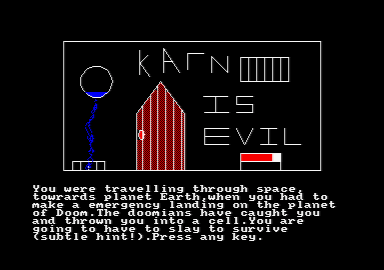 |
| Escape from the Planet of Doom (above) and The Well (below) |
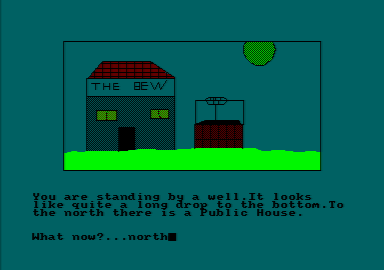 |
Your early games used Incentive's Graphic Adventure Creator, which originated on the Amstrad and was an early popular choice for authors to use… Had you tried using any other systems before that (such as the Quill) or programming in BASIC? How did you find using GAC? You seemed to be able to rapidly produce titles with it.
"After several years of learning, I had mastered BASIC fully and could program my CPC6128 to do anything it was capable of. I had never written an adventure game in BASIC although I had written some simple arcade games and non-game programs. I tried learning Z80 machine code but never really got anywhere."
"I never had a copy of The Quill, but my parents kindly bought me the GAC and PAW as birthday / Christmas presents after I had owned the CPC6128 for a while."
"Using my CPC6128 was pretty much my only hobby at the time, and I was still at school. So I had plenty of time after school and at weekends to program my Amstrad. I was definitely a 'loner' in those days and I didn't enjoy school at all, so throwing myself into my Amstrad was a welcome distraction. In fact I probably spent more time programming and writing games than playing games / using programs written by other people… apart from Monty On The Run and Starquake!"
You were obviously quite young at the time so those GAC titles may not be the most polished games out there, but when playing them your enthusiasm and passion for text adventures is obvious. They're all interesting in some way, whether it's the charming pictures, the surreal puzzles, or the fairly unusual settings. Can you remember much about them or the process of working on them?
"I'm afraid I don't! Before seeing the screenshots [you sent me], I couldn't even have named a single one off the top of my head! I do remember writing adventures using the GAC, but the Professional Adventure Writer (PAW) is the one that really sticks in my mind. I couldn't have told you that I was using the GAC before PAW."
"I can't draw to save my life, so if the GAC pictures are 'charming' then it's probably because they are so bad / strange that they stuck in your mind."
"I'm sure that most of my adventures were loosely based on real places, events, or situations, or conversations that I'd heard / TV programmes that I'd seen etc. My Dad loved sailing (he owned a mirror dinghy) and I spent quite a few hours with him at the local yacht club at weekends down the years. Although sailing never interested me, The Race was based on the yacht club in terms of the layout."
I love the fact that real-life locations are often captured in homegrown games... They can often be like little time capsules of an author's life!
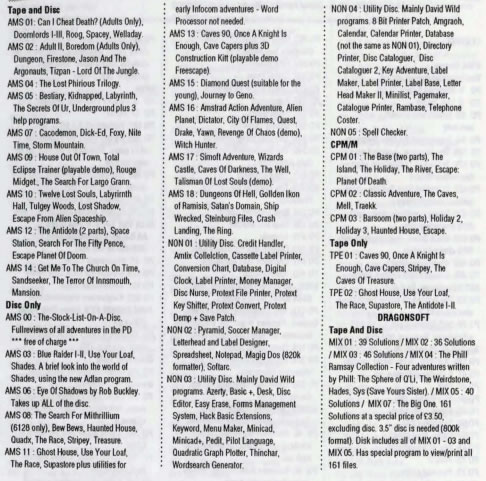 |
| (Above: Some of the Amstrad CPC adventures available from Debby Howard's Adventure PD. Debby would go on to become the adventure columnist for Amstrad Action) |
One of the more unique features about the Amstrad scene, that set it apart from similar machines like the ZX Spectrum, was the strong public domain software community; no doubt helped by the popularity of the disk-based CPCs. Libraries included Tony Kingsmill's Data PD and Debby Howard's Adventure PD. What are your memories of the public domain side of things?
"If my memory serves correctly, my very first experience of a PD library was Scull PD in Scotland run by Alan Scully who sent me a 3 inch disc of PD programs. However not long after that, I discovered Robot PD (or was it Data PD? Can't remember!) I think I sent in programs on tape rather than disc, and on a fairly regular basis."
"I assume I read about these libraries in ACU or AA… in fact, I think it was AA that promoted PD libraries more. In the end, I sent all the programs I wrote directly to just one PD library. I remember the name Tony Kingsmill, and the name Richard Fairhurst [Robot PD] is in my mind as well. I might have corresponded with Debby Howard just once or twice. I really can't remember!"
The public domain libraries seemed to be great, low-pressure outlets for amateur authors… and there were some excellent games released as Amstrad PD from authors such as Simon Avery, Ken Bond, Rob Buckley, Tony Kingsmill, and Len Townsend…
"Ken Bond is the name that really jumps out. Ken introduced me to the PAW through his game The Base. He had a letter published (in ACU I think) saying that he had written this game purely for the enjoyment of writing it. He had not thought about selling it but he wanted to share it. I sent him a blank disc and a self-stamped addressed envelope and Ken kindly sent me a copy. We exchanged several letters after that, and he kindly gave me some hints and tips about programming games using PAW."
Yes, Ken was very knowledgeable about the PAW. He'd started out with the Quill on the Amstrad, but later produced extended versions of several of his games (such as The Base and Castle Warlock) using the more advanced Gilsoft tool.
"It is quite possible that, without Ken, I would never have discovered PAW and would have continued using nothing but the GAC."
There were "commercial" homegrown text adventure mail-order firms too, though, such as Joan Pancott's WoW, Tony Collins' The Guild, Recreation Re-creation, and The Adventure Workshop… Their products were reviewed in fanzines like Red Herring and Adventure Probe, which ran an annual convention in Birmingham…
"The name Joan Pancott rings a bell… was she the first (and only) person ever to receive the HPilg accolade? I seem to remember it turned into HBalg from the very next edition of AA. I was probably too young to go to a convention, and I have always lived on the Sussex coast so Birmingham is a couple of hundred miles away!"
As well as writing text adventures, you also wrote the adventure column for Tim Blackbond's Artificial Intelligence fanzine. It was a fairly sporadic publication, that I believe ran for only eight issues, but it was highly regarded (often getting mentions in the Amstrad magazines) and it was certainly a showcase of the DTP powers of the Amstrad.
"I vaguely remember this fanzine, but that's all. I can't remember any details about the adventure column, except I've got half an idea that the person who put the whole fanzine together provided most of the material for the adventure column as well. That does look like my photo in the top left, so I can only assume that the editor contacted me and asked me to do it. I can't imagine that I would have been brave or proactive enough to apply for the job!"
 |
 |
| (Above: Edmund Spicer's adventure column from issue 7 (July/August 1992) of the Amstrad PD fanzine Artificial Intelligence) | |
Your later games used the CP/M version of Gilsoft's Professional Adventure Writer (PAWs) rather than the GAC. It was a very powerful system, where adventures were constructed using a source text document, and it could take advantage of the extra memory of the CPC6128. Why did you make the change to the PAW and how did you find it?
"Ken Bond introduced me to PAW. As I've always had zero artistic ability, I suppose that PAW appealed to me because it was text only. So I didn't have to try to draw anything!! I think I carried on using the GAC as well but to a much lesser extent. In fact I think I programmed at least one game with the GAC (Quad-X) which was almost exclusively text."
Your PAWed games included Minette (where you played a cat trying to rescue her lost kitten) and the three-part (or three-installment?) game, Holiday.
"I'll take your word for it! I have always loved cats, and "Minette" is one of several French words for a cat or a kitten, so that does sound like one of mine! Although I can't remember any of them, I am certain that I programmed way more adventures than just the ones you mention using PAW."
 |
| (In Minette you play a cat trying to retrieve her lost kitten) |
I spotted a game called Amstrad Action Adventure on one of Debby's PD disks. I'm guessing that that may be the game you wrote for the Amstrad Action GAC compo?
"Based on what is written [when it was mentioned in Amstrad Action] I suppose it must have been! I do vaguely remember programming an adventure for this competition. I have never had a competitive bone in my body, so I am sure that my motivation was not to try winning this competition meaning it would not have been a "serious" entry. I probably put an entry in to try to encourage other people to "have a go" as well, and as a gesture of support towards AA."
You namechecked The Forest in your Artificial Intelligence column, but that doesn't seem to have been preserved. Are there any other games that you can remember?
"There are undoubtedly dozens and dozens of programs / games that have been lost, that I wrote in BASIC, GAC or PAW. As I've mentioned before, I was young at the time (early teens) and most of what I produced was probably mediocre at best. I am personally not particularly bothered if none of it ever sees the light of day again!!"
Do you have any material left from those days?
"I'm afraid that I got rid of everything when I disposed of my Amstrad in 2003, including discs, tapes, ACU/AA magazines, my copies of GAC, PAW, the lot. If only I had known how the internet was going to develop, with vintage computers attracting high prices on eBay, an interest in retro computers and gaming etc etc. I loved my Amstrad so much that it never occurred to me to ask my parents to buy me more up-to-date computers as the years went by and technology moved on. If I had done, and if I had taught myself to program each new machine in the same way that I had done with my Amstrad, I wonder sometimes what my life might have become. Perhaps I would be a top computer / games programmer nowadays if I had kept up with developments!"
"These days I can use a Windows PC, but my programming skills are zero. Having written that, if the PAW (or equivalent) is available as a download for Windows and if there are websites for distributing new games, then I could be tempted to try writing one final new adventure game for old time's sake!"
My thanks go to Edmund Spicer for taking the time to answer questions about his games.
|